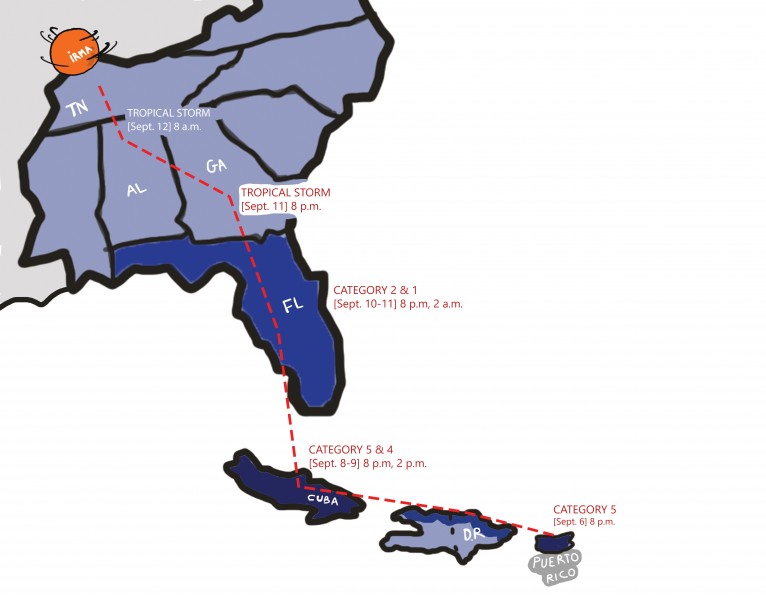Hurricane Irma makes landfall in Virgin Islands, Florida
Hurricane Irma has left a trail of destruction stretching from the Virgin Islands to Northern Florida, reaching speeds of more than 215 mph as it moved west.
Sasha Klein, a freshman studying environmental science and economics, was among the Tulane students who experienced significant hardship due to the hurricane.
Klein was born and raised in the Virgin Islands. When Irma tore through her home island of St. Thomas, Klein was safe in Louisiana. Her family, however, remained in the Caribbean Sea. After Irma hit, she was unable to contact them for three days.
According to Klein, the situation in the Virgin Islands has grown desperate.
“People are going around looting,” Klein said. “There’s no food. Thank God that some members of the Marines came in.”
The Virgin Islands were not alone in facing the storm, as Irma brought devastation and scarcity of goods to Florida. Many Floridians, such as Patrick Henry, a student at the University of Tampa, evacuated to New Orleans.
“The grocery stores around me began running out of basic products like bottled water and non-perishables,” Henry said. “The gas stations began running out of gas and had to have its traffic controlled by police.”
In addition to scarcity, Floridians both inside and outside the state dealt with fear and concern for their friends and families in the path of Irma. Tensions mounted as the storm drew nearer.
“My house was projected to be directly in the eye of the storm, which gave me a lot of anxiety leading up to the weekend,” Jayne Siegel, South Miami resident and Tulane student, said. “I was worried about my parents, my dog and my childhood neighborhood.”
Aside from Irma itself, another pressing concern held by public officials and citizens alike is the storms that may follow in its path.
“These superstorms and their frequency is a direct result of global climate change and rising ocean water temperatures,” Siegel said. “It’s up to everyone to try to decrease the frequencies of these storms.”
On Sept. 15, President Michael Fitts addressed the devastation wrought by Irma in an email to the Tulane community.
“My heart breaks as I view the images of destruction that followed Hurricane Irma’s landfall in the beautiful state of Florida,” Fitts wrote. “Now is the moment that Florida needs us more than ever. As we are still reaching out to our neighbors in Texas, and remembering those impacted in other states, including Louisiana, we are also mobilizing our efforts to help our neighbors to the east in this season of twin tragedies.”
Tulane’s Center for Public Service is offering a variety of opportunities for Tulane students to aid in the relief effort.
The center has said, however, that monetary donations are the most helpful form of hurricane relief at this time. CPS has provided a list of relevant, reputable nonprofits students can support. The list includes organizations based in Texas, Florida and the Caribbean.
“[Tulane Alternative Breaks] is in the process of planning and recruiting for a fall break trip that will provide extra hands to a community that has been heavily impacted during this year’s hurricane season,” President of TAB Emily Thompson said.
Students interested in volunteering with TAB can attend an information session on Sept. 23 in the Lavin-Bernick Center for University Life.
In the immediate future, the Community Action Council for Tulane University Students (CACTUS) has also advised students to donate rather than volunteer.
“We have heard from communities that funding is their biggest need right now, as they don’t have the infrastructure to host volunteers yet,” CACTUS Chair Karissa Chao said. “Therefore, we believe the most immediate, tangible impact we can make is fundraising.”
Students interested in working with CACTUS can learn more about the organization and its upcoming events here.
Your donation will support the student journalists of Tulane University. Your contribution will allow us to purchase equipment and cover our annual website hosting costs.



